#think logically
Text
so my younger cousin is flying in to visit from brazil on sunday, and will be staying here for like, the entirety of july. which, don't get me wrong, is super cool! i love the kid! but it felt like a super weird move, considering his parents are the SUPER strict and borderline helicopter parents. even the smallest prank/roughousing with him/his little sister would lead to a strict talking to from his parents, he couldn't ever do anything without their clear permission, that sort of stuff. so letting him fly at alone at 16 to a whole different country and stay there for a whole month seemed WILDLY out of character. additionally, it just felt like a super last-minute trip. it's not like we have any plans to do when he gets here, and the flight itself and stuff only got booked like, midway through june.
and i was talking to my mom about it, kind of trying to nudge some answers out of her, and after a while she went, "yeah, i think they're sending him over here to get away for his boyfriend. see if the distance breaks them off." which, first of all, surprised me because last i checked, they didn't KNOW he had a boyfriend. literally everyone in the family did EXCEPT for them because while that entire side of the family being semi-conservative, his parents (mostly his dad) are EXTREMELY old-fashioned. so clearly something already went wrong. and considering the only reason the rest of the family knew is because one person found out and it spread like wildfire, i have a sneaking suspicion he wasn't the one to tell them, either.
and second of all. they're sending him HERE. to try to make him forget his homosexuality. i couldn't do anything but just wordlessly gesture to the multiple pride flags scattered around my room, then to myself, because really? he has like two other cousins in the us and they're sending him to me? honey i am about to introduce this kid to queer scenes you have never even heard of. he'll be returning home with labels only shrimp can perceive
#icarus speaks#i fully believe she's correct btw#they are. not the brightest people. and honestly probably believe this is something that could work#cause i can see the logic of get him away and hopefully he'll realize it's a phase. which is Likely what they think#but oh honey you have a big storm coming#side note this is the SECOND time someone's been outed without permission on that side of the family 😭#bitches learned of my transgenderism SO quickly#also even if that's NOT why they sent him here. i will still be rocking his world#they have given me Infinite Power and i will use it to make this kid's life as queer as physically possible
23K notes
·
View notes
Text
the thing about art is that it was always supposed to be about us, about the human-ness of us, the impossible and beautiful reality that we (for centuries) have stood still, transfixed by music. that we can close our eyes and cry about the same book passage; the events of which aren't real and never happened. theatre in shakespeare's time was as real as it is now; we all laugh at the same cue (pursued by bear), separated hundreds of years apart.
three years ago my housemates were jamming outdoors, just messing around with their instruments, mostly just making noise. our neighbors - shy, cautious, a little sheepish - sat down and started playing. i don't really know how it happened; i was somehow in charge of dancing, barefoot and laughing - but i looked up, and our yard was full of people. kids stacked on the shoulders of parents. old couples holding hands. someone had brought sidewalk chalk; our front walk became a riot of color. someone ran in with a flute and played the most astounding solo i've ever heard in my life, upright and wiggling, skipping as she did so. she only paused because the violin player was kicking his heels up and she was laughing too hard to continue.
two weeks ago my friend and i met in the basement of her apartment complex so she could work out a piece of choreography. we have a language barrier - i'm not as good at ASL as i'd like to be (i'm still learning!) so we communicate mostly through the notes app and this strange secret language of dancers - we have the same movement vocabulary. the two of us cracking jokes at each other, giggling. there were kids in the basement too, who had been playing soccer until we took up the far corner of the room. one by one they made their slow way over like feral cats - they laid down, belly-flat against the floor, just watching. my friend and i were not in tutus - we were in slouchy shirts and leggings and socks. nothing fancy. but when i asked the kids would you like to dance too? they were immediately on their feet and spinning. i love when people dance with abandon, the wild and leggy fervor of childhood. i think it is gorgeous.
their adults showed up eventually, and a few of them said hey, let's not bother the nice ladies. but they weren't bothering us, they were just having fun - so. a few of the adults started dancing awkwardly along, and then most of the adults. someone brought down a better sound system. someone opened a watermelon and started handing out slices. it was 8 PM on a tuesday and nothing about that day was particularly special; we might as well party.
one time i hosted a free "paint along party" and about 20 adults worked quietly while i taught them how to paint nessie. one time i taught community dance classes and so many people showed up we had to move the whole thing outside. we used chairs and coatracks to balance. one time i showed up to a random band playing in a random location, and the whole thing got packed so quickly we had to open every door and window in the place.
i don't think i can tell you how much people want to be making art and engaging with art. they want to, desperately. so many people would be stunning artists, but they are lied to and told from a very young age that art only matters if it is planned, purposeful, beautiful. that if you have an idea, you need to be able to express it perfectly. this is not true. you don't get only 1 chance to communicate. you can spend a lifetime trying to display exactly 1 thing you can never quite language. you can just express the "!!??!!!"-ing-ness of being alive; that is something none of us really have a full grasp on creating. and even when we can't make what we want - god, it feels fucking good to try. and even just enjoying other artists - art inherently rewards the act of participating.
i wasn't raised wealthy. whenever i make a post about art, someone inevitably says something along the lines of well some of us aren't that lucky. i am not lucky; i am dedicated. i have a chronic condition, my hands are constantly in pain. i am not neurotypical, nor was i raised safe. i worked 5-7 jobs while some of these memories happened. i chose art because it mattered to me more than anything on this fucking planet - i would work 80 hours a week just so i could afford to write in 3 of them.
and i am still telling you - if you are called to make art, you are called to the part of you that is human. you do not have to be good at it. you do not have to have enormous amounts of privilege. you can just... give yourself permission. you can just say i'm going to make something now and then - go out and make it. raquel it won't be good though that is okay, i don't make good things every time either. besides. who decides what good even is?
you weren't called to make something because you wanted it to be good, you were called to make something because it is a basic instinct. you were taught to judge its worth and over-value perfection. you are doing something impossible. a god's ability: from nothing springs creation.
a few months ago i found a piece of sidewalk chalk and started drawing. within an hour i had somehow collected a small classroom of young children. their adults often brought their own chalk. i looked up and about fifteen families had joined me from around the block. we drew scrangly unicorns and messed up flowers and one girl asked me to draw charizard. i am not good at drawing. i basically drew an orb with wings. you would have thought i drew her the mona lisa. she dragged her mother over and pointed and said look! look what she drew for me and, in the moment, i admit i flinched (sorry, i don't -). but the mother just grinned at me. he's beautiful. and then she sat down and started drawing.
someone took a picture of it. it was in the local newspaper. the summary underneath said joyful and spontaneous artwork from local artists springs up in public gallery. in the picture, a little girl covered in chalk dust has her head thrown back, delighted. laughing.
#writeblr#warm up#this is longer than i wanted i really considered removing that part about myself and what i went thru#but i think it really fucking bothers me that EVERY time i talk about being an artist#ppl assume i just like. had the skill and ability to drop everything and pay for grad school.#like sir i grew up poor. my house wasn't a safe space. i gave up a FREE RIDE TO LAW SCHOOL. for THIS. bc i chose it.#was it fucking hard? was i choosing the hard thing?? yes.#but we need to stop seeing artists as lazy layabouts that can ''afford'' to just ''sit around and create''#when MANY - if not MOST - of us are NOT like that. we have to work our fucking ASSES off. hard work. long and hard work#part of valuing artists is recognizing the amount we sacrifice to make our art. bc it doesn't just#like HAPPEN to us. also btw it rarely has anything to do with true talent.#speaking as someone with a chronic condition i hate when ppl are like u have it easy. like actively as i'm writing this my hands r#ACTIVELY hurting me. i haven't been posting bc my left hand was curled in a claw for the last week#this isn't fucking luck. after a certain point it's not even TALENT. it's dedication & sacrifice.#''u get to flounce around and do nothing with ur life'' is a narrative that is a direct result of capitalism#imagine if we said that about literally any other profession.#''oh so u give up 10 yrs of ur life to be a doctor? u sacrifice having a social life and u get SUPER in debt?#u need to work countless hours and it will often be thankless? well i wish i was that lucky''#we should be applying that logic to landlords ONLY#''oh ur mom and dad gave u the money to buy a house? and all u did was paint it white and rent it? huh.''
10K notes
·
View notes
Text
trans phoenix is a headcanon i can take or leave at the end of the day. but whats important to me is that in a world where phoenix is trans i need edgeworth to have no idea. phoenix Thinks edgeworth knows because they went to elementary school together and phoenix was a girl back then. but edgeworth just assumed he was misremembering because he has approximately 5 total childhood memories that are each around 20-40% accurate and has always been too embarrassed to bring the misconception up since it's not particularly relevant.
#i dont think phoenix has a deadname either i think that he has just always been phoenix.#doesnt come up until theyre trying to fuck#the logic ui in edgeworths brain starts kicking into gear. Connect My Thoughts
6K notes
·
View notes
Text
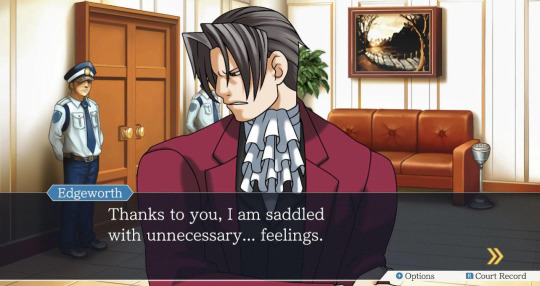
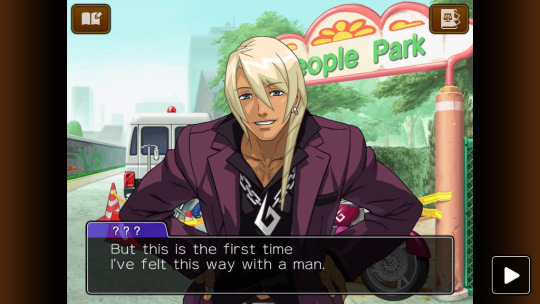
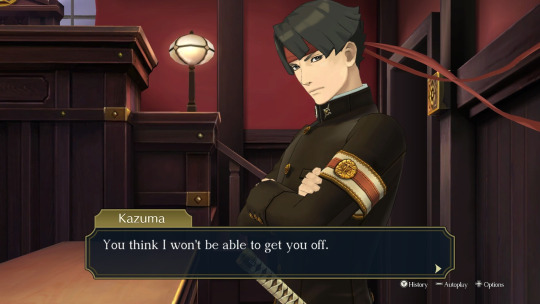
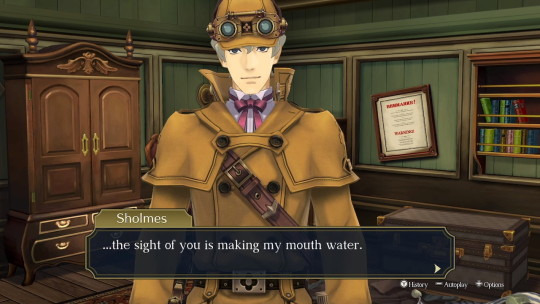
the four horsemen of the apocalypse (wherein you say something interestingly sus)
#ace attorney#dgs#dai gyakuten saiban#the great ace attorney#the great ace attorney chronicles#herlock sholmes#kazuma asogi#miles edgeworth#klavier gavin#narumitsu#wrightworth#klapollo#asoryuu#homumiko#i think about this a lot#especially the one with herlock-#like the first time i encountered it in the game i was absolutely baffled#the woman was too stunned to speak#and then they started playing that epic music during sholmes' logic and reasoning spectacular segment#cool beans cool cool cool#i'm very normal about them
9K notes
·
View notes
Text
leverage is so fucking funny. man manages to find the most mentally ill and neurodivergent group of thieves on the market + an even more mentally ill guy whose literal job description was trying to chase all of them, and forces them into a found family speed-run by trying to blow them all up. they lowkey stage a full fucking country wide coup and are like eh 🤷 just another wednesday. this might be a fun place to vacation tho i guess. sophie shows up to her own funeral twice. they're so good at convincing people of their shit that they make a guy's body start reacting to an illness he doesn't have because it isn't real. go completely out on a limb and basically hand this one guy a new password for his computer so they can get into it and he goes with it. parker and hardison have straight up just "fake it 'till you make it"d into the fbi without even attempting to cover their tracks beyond just These Two Guys. half their clients never asked to be their clients and don't know they're their clients, and the other half are random people who find them who fuckin knows how, meanwhile no government agency can track them down without selling their soul to sterling. they make a point to have a dramatic scene w a Big Bad Shadowy Government Guy who doesn't actually get caught or brought to justice or anything telling them he's going to hunt them all down, and in any other show this would probably earn at least a minor arc later on but he literally never shows up again. an entire season finale hinged on a cake and a bunch of clams. they accidentally made eliot a celebrity not once, not twice, but three times. parker blew up her foster parents' house when she was like. nine. and it's hardly a footnote. hardison is just casually an artistic prodigy but it's only ever brought up for the most background of background gags. eliot's biggest beef with parker and hardison for like two and a half seasons is that they won't stop making weird food with lasers and refuse to realize they can't make a decent beer to save their lives. sophie's immediate response to being shot is to call her shooter a wanker. there's a character who has literally killed a man with a mop and they had the audacity to only put her in one episode.
#leverage my beloved <3#ramble#leverage#i also feel the need to point out that. while yes sophie did show up to her own funeral twice. she also technically was the driver to bring#her own ''corpse'' to wherever interpol was sending it lmfao#re: eliot being made a celeb 3 times bc some people are confused—country singer; baseball player; hockey player#didnt count the knockout job bc i think that was p local focused? could be wrong#re: character who killed a man w a mop = mikel dayan (hitter from the two live crew job)#this post is getting people interested in leverage lets goooooooo#this post has also officially surpassed the number of people i expected to ever know or care about leverage by several thousands#bc even though logically i know it aired as an actual tv show over several years and a lot of people probably saw it#that does not compute in my head#leverage spoilers
11K notes
·
View notes
Text
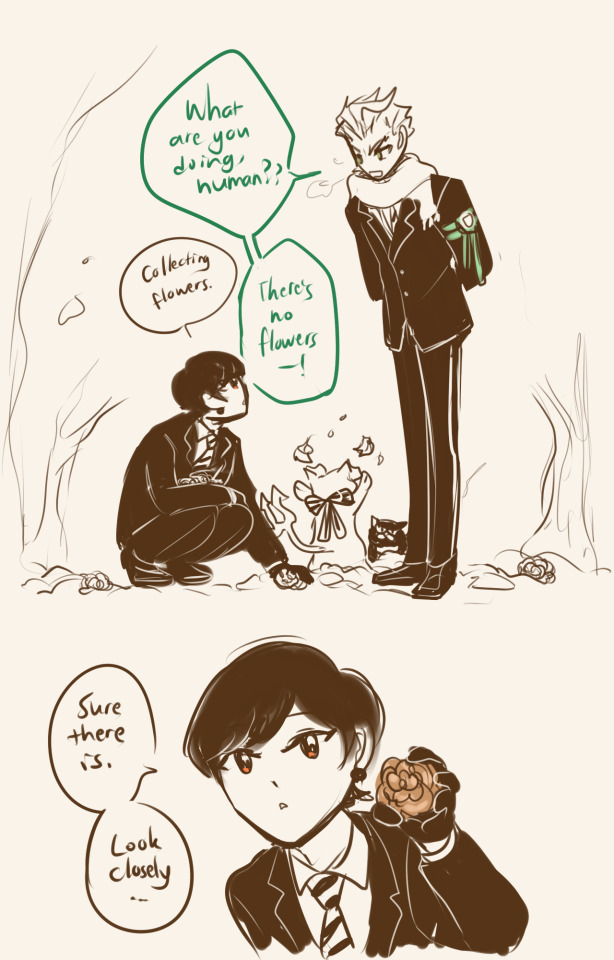
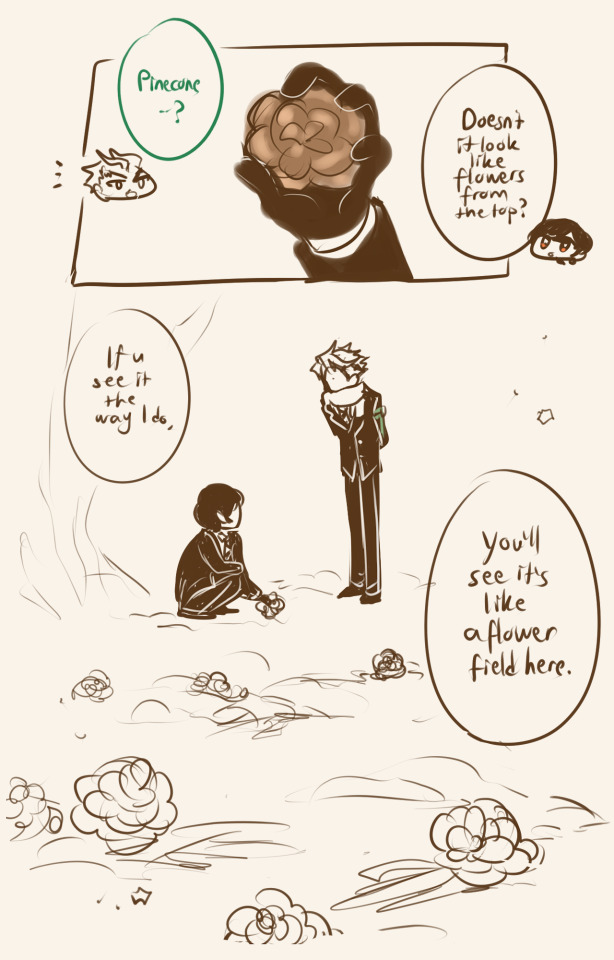
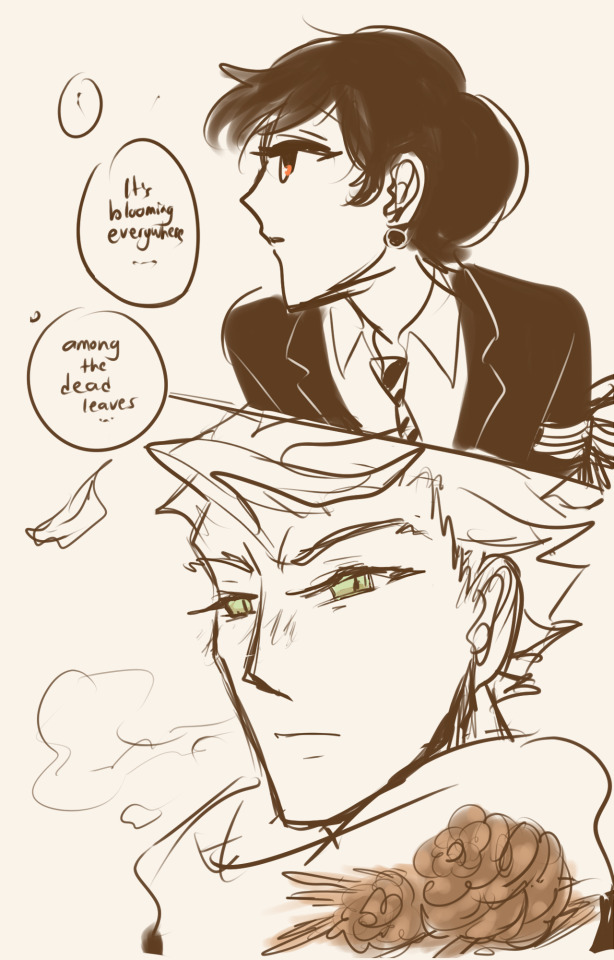
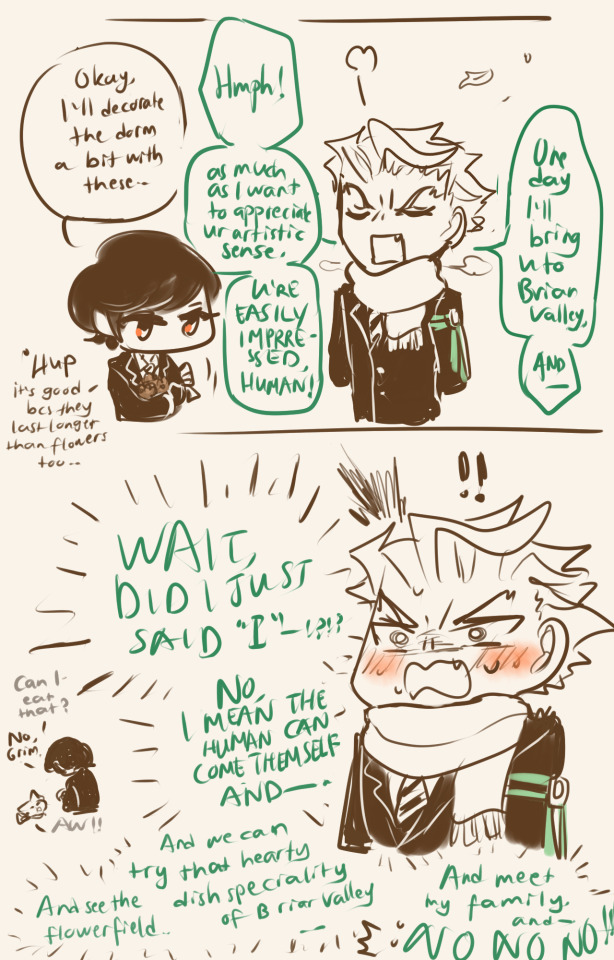
no, but pinecones is really beautiful isn't it ?

#perfect kind of flowers for fae kind who probably feels that flowers die in 0.1 sec bcs of their long life#imagine making mal a pine cone flower wreath and he is so happy with it; that if yuu ever think of selling it king mal mal would order it#for every house in the valley; so everyone has one in their house as new kind of briar valley culture & tradition fhsdh#twst#twisted wonderland#sebek zigvolt#twst yuu#twst mc#twst grim#fanart#i wonder if sebek can see the pinecones as beautiful too#well sebek is weak at subjective thing like art; he might only be able to see things as it is#but he might take on some things from poet or romantic genre books; so i wonder what he sees#i know a fellow who absolutely can't see what i see; i feel like his brain is like a white digital sci fi cube that is clean#and looking so minimalistic it looks like it can only process logical things like numbers#it's so weird that some people don't actually process things by imagining a lot of other things visually in their mind
1K notes
·
View notes
Text
Sorry if some of these overlap a little/if I left out something obvious kajbdsjkd I tried my best haha. And that's why there's an "other" option!
#coffeebanana polls#personally i think i'm good at writing emotions!#and that's funny to me because growing up i was very much not an emotional person#i had to sort of learn to value emotional intelligence as opposed to pure logic. and i probably repressed some things kjabdfskj#so i'm proud that emotions come through in my writing!#fiction has always been something i can use to connect emotionally even when i struggled doing that irl#and i think that's really cool#anyways i'm looking forwards to seeing what you all love about your writing!!!
9K notes
·
View notes
Text
The problem with thinking Hannibal loved any other character besides Will (and Mischa) is that he literally destroyed his whole life, his carefully crafted life and security and comfort and freedom and EVERYTHING, because he felt love for Will. He lost his mind. It's not something that would happen if he was used to the feeling of love. He might like, or even respect some people, but love? This doesn't really add up to his own behavior. He tried to REVERSE TIME. REVERSE TIME. This is a guy who never thinks he's wrong or tends to justify his wrong doings, and he regretted what he did just because he couldn't have Will. He never felt this for anyone else. He literally ATE his own SISTER because he loved her and that made him feel weak and vulnerable. I don't think he comes even close to loving anyone else. He might find them interesting and pleasant to be around some times, and even cares about them to some degree, like Abigail, but he only cared because he projected Mischa unto her and because she was a mediator between him and Will and his fantasies about having a family, but love?? LOVE??
#that cannibal heart beats only for one person yall#and its not a ship thing it's just logic i dont think it makes sense with how he behaves in general#he is PASSIONATE but i dont see how he could love someone else#nbc hannibal#hannigram#hannibal#will graham#murder husbands#hannibal lecter#hugh dancy#mads mikkelsen#analysis
2K notes
·
View notes
Text
Alfred comes home and there's a whole noise from the kitchen.
Alfred: Is everything okay?
Damian: Dumbass is coming out.
Alfred: Oh.
Alfred (to Dick): ...I figured this day would come sooner or later...
Dick:
Alfred: Don't think I didn't saw it my boy, and pardon me if I should said something before...
Dick: No, no, no it's not
Alfred:... I mean It was obvious from the start but I figured I shouldn't press-
Dick: Alfie It's not
Jason: No, no let him finish.
----
Batman: Yes, my kid also came out to me recently.
Superman (to Dick): Oh wow, that's great! I'm proud of you buddy.
Dick:
Dick: What
Tim: It's me.
Superman: Oh
Superman: Oh wow, thats great! I'm proud of you buddy.
Dick: No, wait you can't just-
----
Jon: I'm just glad in not being alone in this, you know.
Titans:
Dick: It's not me.
Titans: "Oh, right. Sure." " Yeah we knew it" "Totally"
#I've been thinking about this since Tim came out beaceus that was pretty much every reaction from everyone I know#And i find fucking hilarious#Tim had more in lore logic but Grayson just screams queer energy and there's no way people around him didn't caught up onto that#jason todd#tim drake#dick grayson#batfam#incorrect quotes#batfamily incorrect quotes#the funniest part is that if gotham knights is cannon he might actually be and this is just him being confused#on how people think he'll need to come out#but if he's not he's the talk Valentina of the family and we love him anyway
11K notes
·
View notes
Text
Love that Grian has decided now is the time to use digging straight down as a mining strat, post-1.19 where it's pretty easy to dig into a huge cavern and then fall 80 blocks to the ground, or survive the fall but be surrounded by mobs, or fall onto an patch of dripstone, or fall into a MASSIVE lava lake, or land in an ancient city/deep dark biome, or-
#I can't actually think of any other deathtraps but ending with ''or-" just sounded funnier#i do understand his logic tbh like he's got a point#it's just so funny thinking of how many more hazards there are now lol#godspeed grian I believe in you anyway#grian#hermitcraft 10#hermitcraft#lee speaks
1K notes
·
View notes
Text

a little experiment
#rainworld#looks to the moon#five pebbles#rainworld downpour#rainworld hunter#rainworld survivor#rainworld monk#rain world#i know i said i think that while monk has parallels with pebbles moon logically would have survivor#but im starting to enjoy the thought of moon having parallels with hunter as both are doomed to fall despite their best efforts#both terribly wanting to live despite being doomed#i see hunter as this energetic thing that thrives through the thrill of a life it knows deep down is going to be short#something brute forcing its way through its illness just to live a little longer#it and moon are made of the same stuff... neither wanted this fate so they struggle until the end against it
2K notes
·
View notes
Text
wait wait wait we've seen this before. we've seen someone ignore the fears so hard that she survived a ritual. sure, alice is flippant like tim, but the way she just ignores and compartmentalizes the horrible things she's forced to witness is so much like basira.
#their personalities don't align much otherwise (as far as we know) but still!! think about it!!#basira (anti)logic-ed and ignored her way out of the unknowing!#tmagp#tmagp analysis#the magnus protocol#tma#alice dyer#tim stoker#basira hussain#bs.txt
1K notes
·
View notes
Text
sometimes we just need someone to pay enough attention.
for the longest time i had been trying to read The Lord of The Rings. everyone had sung the praises for it, over and over. i'd seen clips of the movie and it seemed like it could be fun, but actually reading it was fucking horrible.
my parents had the omnibus - all the books squished into one big tome - and in the 4th grade i started sort of an annual tradition: i would start trying to read TLR and get frustrated after about a month and put it back down. at first i figured i was just too young for it, and that it would eventually make sense.
but every time i came back to it, i would find myself having the exact same experience: it was confusing, weird, and dry as a fucking bone. i couldn't figure it out. how had everyone else on earth read this book and enjoyed it? how had they made movies out of this thing? it was, like, barely coherent. i would see it on "classics" list and on every fantasy/sci-fi list and everyone said i should read it; but i figured that it was like my opinion of great expectations - just because it's a classic doesn't mean i'm going to like experiencing it.
at 20, i began the process of forcing myself through it. if i had to treat the experience like a self-inflicted textbook, i would - but i was going to read it.
my mom came across me taking notes at our kitchen table. i was on the last few pages of the first book in the omnibus, and i was dreading moving on to the next. she smiled down at me. only you would take notes on creative writing. then she sat down and her brow wrinkled. wait. why are you taking notes on this?
i said the thing i always said - it's boring, and i forget what's happening in it because it's so weird, and dense. and strange.
she nodded a little, and started to stand up. and then sat back down and said - wait, will you show me the book?
i was happy to hand it over, annoyed with the fact i'd barely made a dent in the monster of a thing. she pulled it to herself, pushing her glasses up so she could read the tiny writing. for a moment, she was silent, and then she let out a cackle. she wouldn't stop laughing. oh my god. i cannot wait to tell your father.
i was immediately defensive. okay, maybe i'm stupid but i've been trying to read this since the 4th grade and -
she shook her head. raquel, this is the Silmarillion. you've been reading the Silmarillion, not the lord of the rings.
anyway, it turns out that the hobbit and lord of the rings series are all super good and i understand why they're recommended reading. but good lord (of the rings), i wish somebody had just asked - wait. this kind of thing is right up your alley. you love fantasy. it sounds like something might be wrong. why do you think it's so boring?
#thanks for reminding me this happened#writeblr#warm up#i don't think this story translates well to the page#IRONIC!!!! :)#but yeah man i read the Silmarillion before i read the hobbit#the omnibus didn't explain what it was and i figured - you start at the beginning and then you read from the beginning#that's how books work#how was i supposed to know#EDIT IN THE TAGS: hi i think i worded this in a confusing way#the omnibus had ALL the stories in it - the silm#the hobbit#and all of LOTR#they just put the silm in the front so i thought logically it was the first book#that's how an omnibus usually works after all - the first book in the series is the first book in the tome#to be fair i GUESS the silm takes place “before” the hobbit????
6K notes
·
View notes
Text
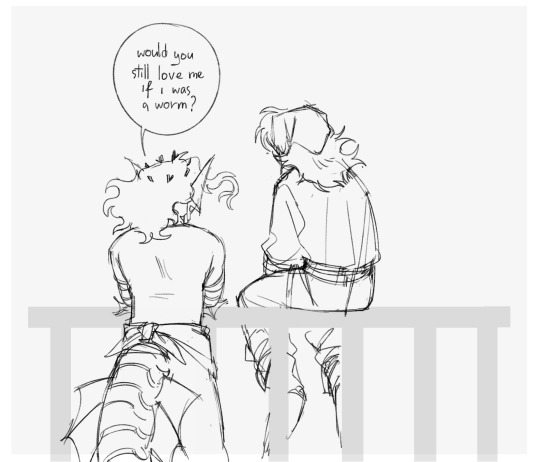

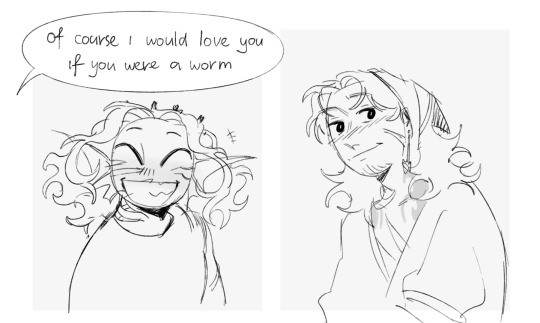
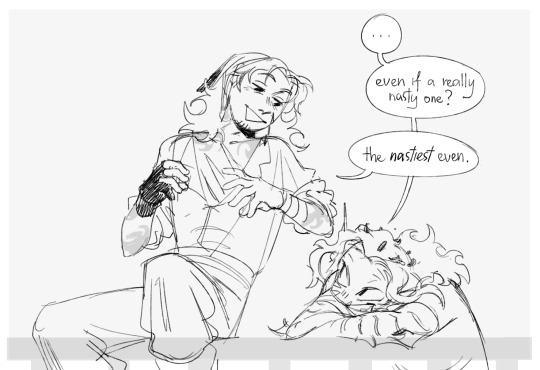
so, would you?
nothing important under the cut, you don't need to look haha
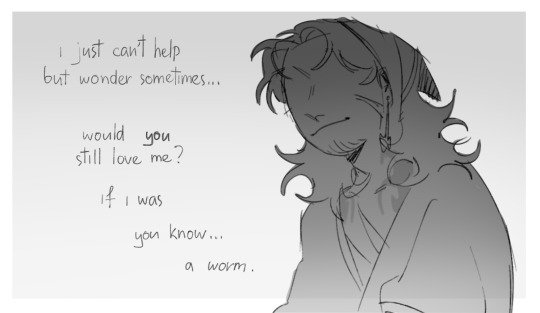
#inspired by the random youtube short i saw about how these types of questions are not really about logic but about emotion and reassurance#doesn't matter if the question doesn't make sense. you say 'yes' because you love them no matter what. not because its a worm or a bug or#or anything. its a way of saying 'i will love you when you've changed and when you're different. because it's still *you*.'#idk something about it just felt so gentle and genuine. like a pure display of affection through a silly question...#and of course fnc was the first thing i thought about because i got brainworms#jrwi fish and chips#jrwi riptide#jrwi chip#gillion tidestrider#my art#sketch#also im back from a vacation! and i feel so awful i got sick the first day home and im sitting here at 6am drawing fishes and chips#the dialog feels a little ooc but i cant figure out if it really is or if its because my head hurts and i cant think#tbh it doesn't really matter.......... but it matters to me augh#ALSO yes the under the cut bit is about episode 109. i dont know if its clear or not
2K notes
·
View notes
Text
eleven is fascinating to me because he came right off the back of tens horrible traumatic breakdown after he lost everything and he immediately tried to establish himself as the opposite of that. he is funny and goofy and almost childlike, and he bulldozes on in his adventures with amy like nothing happened at all. but then something happens and his masks slips and it's like oh! the core of this man is still anger. he is so so angry all of the time and this façade is the only thing stopping him from being consumed by it. he isn't over any of it and he hasn't moved on. he is wearing a fez and laughing but under that all that exists is age old anger and grief and it is going to consume him
#i do think that this pit of anger was eventually covered and soothed by the ponds#but he didn't adress it and he couldn't even look at it until he was twelve#when he stopped pushing back and repressing everything and finally allowed himself to exist as he was#but ok listen#its all layed out in the first 3 episodes of season 5 and in the way amy sees him#episode 1. here is the new doctor he is energetic and reeling and fun#episode 2. the space whale comparison. here is the new doctor. he is unthinkably ancient and almost godlike but he is so so kind#and patient and good. he is ancient and lonely but he can't stand to see children cry. so the doctor helps people#episode 3. daleks. the doctor is a soldier. these are his age old enemies. he wants them dead and he will stop at nothing#all logic and reason vanish. he is hitting the dalek with a pipe and yelling his head off while amy watches in horror#like obviously we know why but amy didnt#this is not a sane or rational man he is unstable and angry#and in that episode he was stripped back to what he largely is: hate#you would make a good dalek ect ect ect#anyway 3 episodes with 3 very distinct and equally definitely traits layed out like: here you go#i don't like elevens era much but those first 3 episodes were great#doctor who#eleven#amy#eleventh doctor#matt smith#dr who#dw#i mean idk this is what river literally had to spell out for him#eleven was careening completely out of control#how long til doctor means warrior indeed?#mine
1K notes
·
View notes
Text
tools not rules: the importance of critical thinking
More than once, I’ve talked about the negative implications of Evangelical/purity culture logic being uncritically replicated in fandom spaces and left-wing discourse, and have also referenced specific examples of logical overlap this produces re, in particular, the policing of sexuality. What I don’t think I’ve done before is explain how this happens: how even a well-intentioned person who’s trying to unlearn the toxic systems they grew up with can end up replicating those systems. Even if you didn’t grow up specifically in an Evangelical/purity context, if your home, school, work and/or other social environments have never encouraged or taught you to think critically, then it’s easy to fall into similar traps - so here, hopefully, is a quick explainer on how that works, and (hopefully) how to avoid it in the future.
Put simply: within Evangelism, purity culture and other strict, hierarchical social contexts, an enormous value is placed on rules, and specifically hard rules. There might be a little wiggle-room in some instances, but overwhelmingly, the rules are fixed: once you get taught that something is bad, you’re expected never to question it. Understanding the rules is secondary to obeying them, and oftentimes, asking for a more thorough explanation - no matter how innocently, even if all you’re trying to do is learn - is framed as challenging those rules, and therefore cast as disobedience. And where obedience is a virtue, disobedience is a sin. If someone breaks the rules, it doesn’t matter why they did it, only that they did. Their explanations or justifications don’t matter, and nor does the context: a rule is a rule, and rulebreakers are Bad.
In this kind of environment, therefore, you absorb three main lessons: one, to obey a rule from the moment you learn it; two, that it’s more important to follow the rules than to understand them; and three, that enforcing the rules means castigating anyone who breaks them. And these lessons go deep: they’re hard to unlearn, especially when you grow up with them through your formative years, because the consequences of breaking them - or even being seen to break them - can be socially catastrophic.
But outside these sorts of strict environments - and, honestly, even within them - that much rigidity isn’t healthy. Life is frequently far more complex and nuanced than hard rules really allow for, particularly when it comes to human psychology and behaviour - and this is where critical thinking comes in. Critical thinking allows us to evaluate the world around us on an ongoing basis: to weigh the merits of different positions; to challenge established rules if we feel they no longer serve us; to decide which new ones to institute in their place; to acknowledge that sometimes, there are no easy answers; to show the working behind our positions, and to assess the logic with which other arguments are presented to us. Critical thinking is how we graduate from a simplistic, black-and-white view of morality to a more nuanced perception of the world - but this is a very hard lesson to learn if, instead of critical thinking, we’re taught instead to put our faith in rules alone.
So: what does it actually look like, when rule-based logic is applied in left-wing spaces? I’ll give you an example:
Sally is new to both social justice and fandom. She grew up in a household that punished her for asking questions, and where she was expected to unquestioningly follow specific hard rules. Now, though, Sally has started to learn a bit more about the world outside her immediate bubble, and is realising not only that the rules she grew up with were toxic, but that she’s absorbed a lot of biases she doesn’t want to have. Sally is keen to improve herself. She wants to be a good person! So Sally joins some internet communities and starts to read up on things. Sally is well-intentioned, but she’s also never learned how to evaluate information before, and she’s certainly never had to consider that two contrasting opinions could be equally valid - how could she have, when she wasn’t allowed to ask questions, and when she was always told there was a singular Right Answer to everything? Her whole framework for learning is to Look For The Rules And Follow Them, and now that she’s learned the old rules were Bad, that means she has to figure out what the Good Rules are.
Sally isn’t aware she’s thinking of it in these terms, but subconsciously, this is how she’s learned to think. So when Sally reads a post explaining how sex work and pornography are inherently misogynistic and demeaning to women, Sally doesn’t consider this as one side of an ongoing argument, but uncritically absorbs this information as a new Rule. She reads about how it’s always bad and appropriative for someone from one culture to wear clothes from another culture, and even though she’s not quite sure of all the ways in which it applies, this becomes a Rule, too. Whatever argument she encounters first that seems reasonable becomes a Rule, and once she has the Rules, there’s no need to challenge them or research them or flesh out her understanding, because that’s never been how Rules work - and because she’s grown up in a context where the foremost way to show that you’re aware of and obeying the Rules is to shame people for breaking them, even though she’s not well-versed in these subjects, Sally begins to weigh in on debates by harshly disagreeing with anyone who offers up counter-opinions. Sometimes her disagreements are couched in borrowed terms, parroting back the logic of the Rules she’s learned, but other times, they’re simply ad hominem attacks, because at home, breaking a Rule makes you a bad person, and as such, Sally has never learned to differentiate between attacking the idea and attacking the person.
And of course, because Sally doesn’t understand the Rules in-depth, it’s harder to explain them to or debate with rulebreakers who’ve come armed with arguments she hasn’t heard before, which makes it easier and less frustrating to just insult them and point out that they ARE rulebreakers - especially if she doesn’t want to admit her confusion or the limitations of her knowledge. Most crucially of all, Sally doesn’t have a viable framework for admitting to fault or ignorance beyond a total groveling apology that doubles as a concession to having been Morally Bad, because that’s what it’s always meant to her to admit you broke a Rule. She has no template for saying, “huh, I hadn’t considered that,” or “I don’t know enough to contribute here,” or even “I was wrong; thanks for explaining!”
So instead, when challenged, Sally remains defensive: she feels guilty about the prospect of being Bad, because she absolutely doesn’t want to be a Bad Person, but she also doesn’t know how to conceptualise goodness outside of obedience. It makes her nervous and unsettled to think that strangers could think of her as a Bad Person when she’s following the Rules, and so she becomes even more aggressive when challenged to compensate, clinging all the more tightly to anyone who agrees with her, yet inevitably ending up hurt when it turns out this person or that who she thought agreed on What The Rules Were suddenly develops a different opinion, or asks a question, or does something else unsettling.
Pushed to this sort of breaking point, some people in Sally’s position go back to the fundamentalism they were raised with, not because they still agree with it, but because the lack of uniform agreement about What The Rules Are makes them feel constantly anxious and attacked, and at least before, they knew how to behave to ensure that everyone around them knew they were Good. Others turn to increasingly niche communities and social groups, constantly on paranoid alert for Deviance From The Rules. But other people eventually have the freeing realisation that the fixation on Rules and Goodness is what’s hurting them, not strangers with different opinions, and they steadily start to do what they wanted to do all along: become happier, kinder and better-informed people who can admit to human failings - including their own - without melting down about it.
THIS is what we mean when we talk about puritan logic being present in fandom and left-wing spaces: the refusal to engage with critical thinking while sticking doggedly to a single, fixed interpretation of How To Be Good. It’s not always about sexuality; it’s just that sexuality, and especially queerness, are topics we’re used to seeing conservatives talk about a certain way, and when those same rhetorical tricks show up in our fandom spaces, we know why they look familiar.
So: how do you break out of rule-based thinking? By being aware of it as a behavioural pattern. By making a conscious effort to accept that differing perspectives can sometimes have equal value, or that, even if a given argument isn’t completely sound, it might still contain a nugget of truth. By trying to be less reactive and more reflective when encountering positions different to your own. By accepting that not every argument is automatically tied to or indicative of a higher moral position: sometimes, we’re just talking about stuff! By remembering that you’re allowed to change your position, or challenge someone else’s, or ask for clarification. By understanding that having a moral code and personal principles isn’t at odds with asking questions, and that it’s possible - even desirable - to update your beliefs when you come to learn more than you did before.
This can be a scary and disquieting process to engage in, and it’s important to be aware of that, because one of the main appeals of rule-based thinking - if not the key appeal - is the comfort of moral certainty it engenders. If the rules are simple and clear, and following them is what makes you a good person, then it’s easy to know if you’re doing the right thing according to that system. It’s much, much harder and frequently more uncomfortable to be uncertain about things: to doubt, not only yourself, but the way you’ve been taught to think. And especially online, where we encounter so many more opinions and people than we might elsewhere, and where we can get dogpiled on by strangers or go viral without meaning to despite our best intentions? The prospect of being deemed Bad is genuinely terrifying. Of course we want to follow the Rules. But that’s the point of critical thinking: to try and understand that rules exist in the first place, not to be immutable and unchanging, but as tools to help us be better - and if a tool becomes defunct or broken, it only makes sense to repair it.
Rigid thinking teaches us to view the world through the lens of rules: to obey first and understand later. Critical thinking teaches us to use ideas, questions, contexts and other bits of information as analytic tools: to put understanding ahead of obedience. So if you want to break out of puritan thinking, whenever you encounter a new piece of information, ask yourself: are you absorbing it as a rule, or as a tool?
10K notes
·
View notes